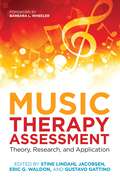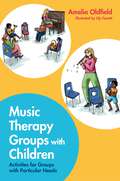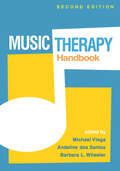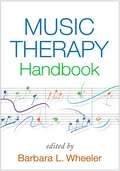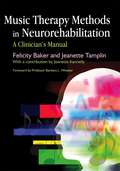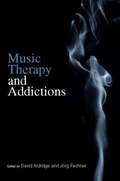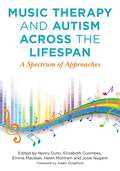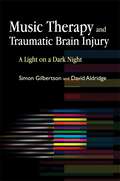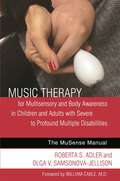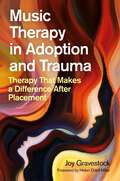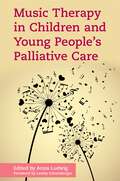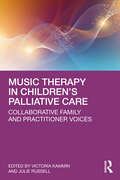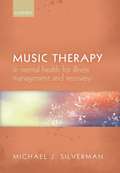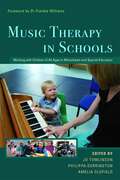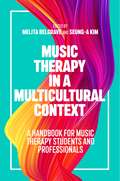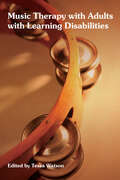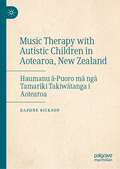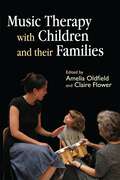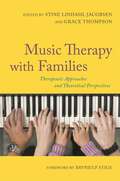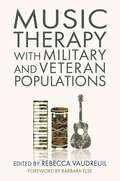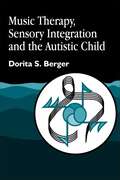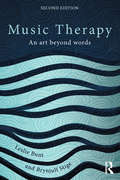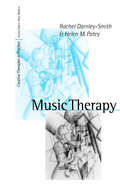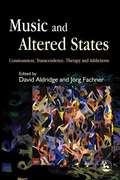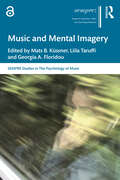- Table View
- List View
Music Therapy Assessment: Theory, Research, and Application
by Barbara L. Wheeler Stine Lindahl Jacobsen Eric G. Waldon Gustavo Schulz GattinoAs the use of music therapy becomes more widespread so too does the need for detailed assessment. Standardised assessment tools, and knowledge of how to integrate assessment into clinical practice, are needed for teaching, research and clinical purposes all around the world. Based on the findings of members of the International Music Therapy Assessment Consortium (IMTAC), this comprehensive anthology collects the latest research and clinical practice methods about music therapy assessment. Looking at the available assessment tools holistically, the book covers the major assessment models currently used in clinical practice, and details each model's setting and motivation, development, theoretical background, and how to implement it in a clinical setting.
Music Therapy Groups with Children: Activities for Groups with Particular Needs
by Amelia OldfieldThis one-stop practical book guides you to run a wide range of music therapy groups with pre-school and primary aged children with additional needs. Gain understanding on how to adapt and improvise to ensure that the group meets the individual child's needs, from simple tweaks - such as selecting easier to use instruments and adjusting table heights - to improvising on a single line instrument while dancing around the room. This book includes specific guidance on how to structure sessions to cater for children with neurodivergent needs, physical and learning disabilities, and those receiving psychiatric support, with tailored sessions for each client group.60 ideas of group activities, complete with sheet music and helpful illustrations to bring the text to life, make this book your ideal practice companion.
Music Therapy Handbook
by Barbara L. Wheeler Michael Viega Andeline Dos SantosRich with case material, the second edition of this respected text has been thoroughly revised with many new contributing authors and 85% new material. The Handbook comprehensively explores music therapy theory, research, and practice. Chapters cover foundational concepts and therapeutic processes, major approaches to practice, and clinical applications with people of all ages. The second edition has a heightened focus on diversity, equity, inclusion, accessibility, and cultural humility. Expert contributors describe state-of-the-art practices for using music to foster clients' well-being and recovery in a broad range of mental health, medical, and community settings. New to This Edition Expanded coverage of working with marginalized communities, including racially minoritized, refugee, LGBTQIA+, and neurodiverse clients, and an increased emphasis on therapist reflexivity. Provides an integrated conceptual framework for understanding different music therapy approaches. First edition editor Barbara L. Wheeler is joined by Michael Viega and Andeline dos Santos, who bring fresh perspectives and a more international scope.
Music Therapy Handbook (Creative Arts and Play Therapy)
by Barbara L. WheelerRich with case material, this groundbreaking volume provides a comprehensive overview of music therapy, from basic concepts to emerging clinical approaches. Experts review psychodynamic, humanistic, cognitive-behavioral, and developmental foundations and describe major techniques, including the Nordoff-Robbins model and the Bonny Method of Guided Imagery and Music. An expansive section on clinical applications examines music therapy with children and adults, as well as its recognized role in medical settings. Topics include autism spectrum disorder, school interventions, brain injury, and trauma. An authoritative resource for music therapists, the book also shows how music can be used by other mental health and medical professionals. The companion website features audio downloads illustrative of the Nordoff-Robbins model.
Music Therapy Methods in Neurorehabilitation: A Clinician's Manual
by Felicity Baker Jeanette Tamplin Jeanette Kennelly Barbara L WheelerThe value of music therapy in neurological rehabilitation is increasingly recognised and this practical manual provides comprehensive guidance for clinicians on the application of music therapy methods in neurorehabilitation. Felicity Baker and Jeanette Tamplin combine research findings with their own clinical experience and present step-by-step instructions and guidelines on how to implement music therapy techniques for a range of therapeutic needs. Photographs clearly illustrate interventions for physical rehabilitation, for example through the use of musical instruments to encourage targeted movement. The chapter on cognitive rehabilitation includes resources and lists suitable songs for use in immediate memory or abstract thinking tasks, among others. In her chapter on paediatric patients, Jeanette Kennelly demonstrates how procedures can be adapted for working clinically with children. A comprehensive list of terminology commonly used in neurological rehabilitation is also included. Music Therapy Methods in Neurorehabilitation will prove an invaluable reference book for music therapy clinicians and students. It is also suitable for work with other populations, in particular for work in special education.
Music Therapy and Addictions
by David Aldridge Jörg FachnerRecent studies show that music can reach the parts of the human brain that are linked to addiction, and can function as an integral part of recovery. This research-based, practical book demonstrates how music and music therapy can be applied in a variety of treatment settings to bring about therapeutic change. Addictions such as alcohol, gambling and drugs are all covered in this interdisciplinary text, and chapters explore everything from the meaning of music in the lives of addicts to devising music therapy programs, enhancing coping strategies and preventing relapse. Lifestyle issues are also considered, along with the role of therapeutic communities, and connections in the brain between addiction, music, memory and emotion. The strategies outlined are relevant to addicts and recovering addicts of all ages. This book will be of interest to music therapists, substance abuse counsellors, and anybody else interested in the relationship between music and addiction and the therapeutic use of music.
Music Therapy and Autism Across the Lifespan: A Spectrum of Approaches
by Adam Ockelford Henry Dunn Helen Mottram Elizabeth Coombes Emma Maclean Josie NugentThe use of music therapy is long established with people with Autistic Spectrum Conditions. The combination of using music and relationship work in person-centred approaches supports the three main areas of difficulty people with autism often experience; social interaction, communication and imagination. Current research supports the positive psychological benefits of music therapy when people with autism spectrum conditions engage with music therapy.This book celebrates the richness of music therapy approaches and brings together the voices of practitioners in the UK. With a strong focus on practice-based evidence it showcases clinicians, researchers and educators working in a variety of settings across the lifespan.
Music Therapy and Traumatic Brain Injury: A Light on a Dark Night
by David Aldridge Simon GilbertsonMusical improvisation is an increasingly recognised rehabilitative therapy for people who have experienced traumatic brain injury initially thought to be `unreachable' or `non-responsive'. Music Therapy and Traumatic Brain Injury demonstrates how music therapy can be used to attend to the holistic, rather than purely functional, needs of people affected by severe head trauma. Divided into three parts, the first section provides an introduction to the effects brain injury has on a person's livelihood. The second is a comprehensive review of available literature on the use of music therapy in the neurorehabilitative setting. The final section examines three case studies designed according to `therapeutic narrative analysis', an adaptive research method that uses interviewing and video, which focuses on the unique relationship between the professional and the patient. This book will give clinicians key notes for practice and a vision of the integral role music therapy can have in the successful rehabilitation from brain injury.
Music Therapy for Multisensory and Body Awareness in Children and Adults with Severe to Profound Multiple Disabilities: The MuSense Manual
by Andrea Clark Dr William Cable Grant Howarth Olga Samsonova-Jellison Roberta Adler Xueyan HuaThis book offers the practical, ready-to-use MuSense program. Originally designed for music therapists working with individuals with profound multiple disabilities, the MuSense program provides comprehensive guidance to music therapists on how to effectively work with individuals whose needs can be extremely difficult to meet. Containing a robust, structured, evidence-based protocol of music therapy, and supported by case studies throughout, this book is also an essential resource in treatment planning for other diverse populations needing to develop enhanced body and sensory awareness.
Music Therapy in Adoption and Trauma: Therapy That Makes a Difference After Placement
by Joy GravestockMusic therapy is a valuable method of support and treatment for those dealing with trauma within the adoption community. Music Therapy in Adoption and Trauma offers a timely and much-needed perspective for music and creative arts therapists, as well as families themselves.Addressing topics such as contemporary adoption processes, potential resulting trauma, attachment and adoption breakdown, the book looks at why music therapy specifically can help. Throughout, it centres the value of lived experience in increasing understanding of trauma and effective support. Following a decade of dramatic change within the adoption practice, this book is an invaluable resource for those looking to support individuals and families impacted by adoption.
Music Therapy in Children and Young People's Palliative Care
by Mike Gilroy Kathryn Cave Kirsty Ormston Victoria Kammin Cathy Ibberson Janet McLachlan Dr Giorgos Tsiris Sarah Hodkinson Nathan Vanstone-Howe Joanne Edgar Dr Daphne RicksonThis book brings together music therapists who have worked in the challenging and rewarding world of children's palliative care. Examining techniques from working just with the breath, to technological advances in music therapy such as assistive recording and electronic downloading, it highlights the benefits music therapy can bring when working alongside children and young people. Drawing on the knowledge of expert music therapists, the book provides accessible guidance that practitioners can apply to their own work, including on professional development as part of a multi-disciplinary team, service evaluation, and managing publicity in the hospice setting. It addresses work with different client groups, such as teenagers, and discusses therapy with family members, including siblings. Music therapists and healthcare practitioners will be provided with the tools to reflect on their own professional challenges and deepen their understanding of the important role of music therapy in this sector.
Music Therapy in Children’s Palliative Care: Collaborative Family and Practitioner Voices
by Victoria Kammin Julie RussellGiving voice to the perspectives of children and families with lived experience of children’s palliative care, Music Therapy in Children’s Palliative Care: Collaborative Family and Practitioner Voices explores the integral role of music therapy and its benefits for supporting child and family wellbeing within a range of children’s palliative care settings. This book places the voices of children and families supported by children’s palliative care at the centre as they articulate their own experiences of music therapy alongside music therapists to develop theory and practice in this area.Through their unique, collaborative writing approach, contributing authors ensure that both perspectives of the therapeutic relationship - those of the families and the therapists - are represented throughout, offering a comprehensive view of their shared journey. Readers will benefit from learning about how music therapy may offer physical, emotional, social and spiritual support, aiming to enhance quality of life for both children and families. Equality, inclusion and belonging operate at the heart of this book, capturing the diversity of families that use palliative care services.This book is a must read for any music therapist working within a children’s palliative care setting. It will also be a compelling text for those with lived experiences, practitioners, educators, students and researchers.
Music Therapy in Mental Health for Illness Management and Recovery
by Michael J. SilvermanMany music therapists work in adult mental health settings after qualifying. For many, it will be a challenging and even daunting prospect. Yet until now, there has been no psychiatric music therapy text providing advice on illness management and recovery. <p><p> This essential book fills the gap in the literature, providing the necessary breadth and depth to inform readers of the psychotherapeutic research base and show how music therapy can effectively and efficiently function within a clinical scenario. The book takes an illness management and recovery approach to music therapy specific to contemporary group-based practice. It is also valuable for administrators of music therapy, providing innovative theory-based approaches to psychiatric music therapy, developing and describing new ways to conceptualize psychiatric music therapy treatment, educating music therapists, stimulating research and employment, and influencing legislative policies. <p> An important aim of the book is to stimulate both critical thought and lifelong learning concerning issues, ideas, and concepts related to mental illness and music therapy. Critical thinking and lifelong learning have been - and will likely continue to be - essential aspirations in higher education. Moreover, contemporary views concerning evidence-based practice rely heavily upon the clinician's ability to think critically, seek a breadth of contradicting and confirmatory evidence, implement meta-cognition to monitor thoughts throughout processes, and synthesize and evaluate knowledge to make informed clinical decisions relevant and applicable to idiosyncratic contextual parameters. <p> For both students and clinicians in music therapy, this is an indispensable text to help them learn, develop, and hone their skills in music therapy
Music Therapy in Schools
by Amelia Oldfield Jo Tomlinson Philippa DerringtonThe majority of music therapy work with children takes place in schools. This book documents the wealth and diversity of work that music therapists are doing in educational settings across the UK. It shows how, in recent years, music therapy has changed and grown as a profession, and it provides an insight into the trends that are emerging in this area in the 21st century. Collating the experiences of a range of music therapists from both mainstream and special education backgrounds, Music Therapy in Schools explains the procedures, challenges and benefits of using music therapy in an educational context. These music therapists have worked with children of all ages and abilities from pre-school toddlers in nursery schools to teenagers preparing for further education, and address specific issues and disabilities including working with children with emotional and behavioural problems, and autistic spectrum disorders. This book will be essential reading for music therapists, music therapy students and educational professionals.
Music Therapy in a Multicultural Context: A Handbook for Music Therapy Students and Professionals
by Marisol S. Norris Angélica Pinna-Perez Kamica King Beth Robinson Leah Oswanski Natasha Thomas Maria Gonsalves SchimpfMusic therapy professionals work with diverse population groups, and this book provides therapists, and those in training, with the tools to integrate understanding of different cultural and social identities into their practice.Topics addressed include heritage, age, location, identity and health beliefs, and how to understand the dynamics of the variety of different cultures which music therapists will encounter in the course of their practice. Each chapter is written by an expert on a topic of personal interest in music therapy, explored through a multicultural lens. The chapters include anecdotes, case studies, and practical activities to try, while encouraging the reader to reflect on their own identity as a music therapist.This book is essential reading for all music therapy professionals wanting to practice in a culturally-informed manner, and respect the needs, contributions and strengths of every client.
Music Therapy with Adults with Learning Disabilities
by Tessa WatsonMusic Therapy with Adults with Learning Disabilities explores how music therapists work in partnership with people with learning disabilities to encourage independence and empowerment and to address a wide variety of everyday issues and difficulties. Comprehensive and wide-ranging, this book describes in detail the role and work of the music therapist with adults with learning disabilities. Many clinical examples are used, including casework with people with autism, asperger’s syndrome, profound and multiple learning disabilities and a dual diagnosis of learning disability and mental health problems. The book also explores issues of team work and collaborative working, considering how music therapists and their colleagues can best work together. The chapters are grouped into four sections; an introduction to current music therapy work and policy in the area, clinical work with individuals, clinical work with groups, and collaborative and team work. Guidelines for good practice are also provided. This is a thought-provoking and topical text for all those involved in work with adults with learning disabilities; it is essential reading for music therapists and fellow professionals, carers, policy makers and students.
Music Therapy with Autistic Children in Aotearoa, New Zealand: Haumanu ā-Puoro mā ngā Tamariki Takiwātanga i Aotearoa
by Daphne RicksonIn this unique text, ten cases of music therapy with autistic children (tamariki takiwātanga) are critiqued through the eyes of family members and other autism experts. Rickson uses her wealth of experience to contextualise their rich observations in a thorough review of research and practice literature, to illustrate the ways music therapists engage autistic children in the music therapy process, highlight the various ways music therapy can support their health and well-being, and demonstrate how music therapy processes align with good practice as outlined in the New Zealand Autism Spectrum Disorder Guideline.
Music Therapy with Children and their Families
by Amelia Oldfield Colette Salkeld Emma Davies Jassenka Horvat Claire Flower Helen Loth Sarah Russel Kay Sobey Joy Hasler Nicky O'Neill Rachel Bull Vince Hesketh Tiffany HughesIn the past, music therapy work with children typically took place in special schools without the family being present. More recently, music therapy has become a widespread practice, and this book reflects the variety of settings within which music therapists are now working with children together with their families. The contributors are music therapists with experience of working with children and their families in a range of different environments, such as schools, hospices, psychiatric units, child development centres and in the community. They describe their approaches to family work with client groups including children with autism, learning disabled toddlers, adopted children and looked after teenagers. Their experiences demonstrate that involving the family in a child's music therapy can be beneficial for everyone, and that it is possible to address relationship issues within the family as part of the treatment. This book will provide useful insight into the growing area of music therapy with children and their families, and will be valuable for music therapy professionals and students, as well as other medical and teaching professionals who work with families.
Music Therapy with Families: Therapeutic Approaches and Theoretical Perspectives
by Brynjulf Stige Amelia Oldfield Signe Lindstrøm Hanne Mette Ridder Margaret Barrett Stine Lindahl Jacobsen Vicky Abad Annette Baron Varvara Pasiali Grace Thompson Sören Oscarsson Tali Gottfried Kate Teggelove Kirsi Tuomi Friederike HaslbeckThis comprehensive book describes well-defined models of music therapy for working with families in different clinical areas, ranging from families with special needs children or dying family members through to families in psychiatric or paediatric hospital settings. International contributors explain the theoretical background and practice of their specific approach, including an overview of research and illustrative case examples. Particular emphasis is placed on connecting theory and clinical practice and on discussing the challenges and relevance of each model. This practical and theoretically anchored book will prove valuable for music therapists, students and researchers in the fast developing field of music therapy with families.
Music Therapy with Military and Veteran Populations
by Melissa Walker Elizabeth Freeman Jonathan Crane Donna Betts Justin Francis Brittany Costa David Otto Lisbeth Woodward Nathaniel McLaughlan Danielle Vetro-Kalseth Lisa Fagan Lori Gooding John D. Hogue Hannah Bronson Moira G. McGuire Mack Bailey Barbara Reuer Jason Danley Donna Faraone Sara Kass Megan Wong Natalie Quintana Claudia Avila Diane G. Lantston Karen Wacks Demi BullockCombining essential information, professional insights, and lived experiences, this book offers a unique overview of the use of music therapy with active-duty service members, veterans, and other military-connected populations in the United States. Contributors include music therapists specializing with the military, as well as military personnel, veterans, and their families, providing an in-depth review of the impact that music therapy can have within this community.Detailing the historical evolution of the approach within a military context, the book explores the integration of music therapy into traditional treatment programs for service members and veterans particularly those with TBI and PTSD. Chapters cover the use of music therapy in both individual and group settings, and the opportunities to facilitate therapy via virtual platforms. Throughout, it emphasises the importance of music in military culture, highlighting the benefits of this approach with military communities. Personal accounts from military families are also included, as well as discussion on continued clinical and research innovation within the field.The first book to address this growing practice, it will inspire, inform and empower therapists and professionals working with and supporting military populations.
Music Therapy, Sensory Integration and the Autistic Child
by Dorita S. BergerMusic's ability to influence emotions and moods is universally acknowledged, and music therapists have long known that stimulating the brain through the auditory system is a key to obtaining remarkable responses. Music therapy is a particularly effective tool when working with children with autism spectrum conditions, because music communicates with these children on a level where mere words cannot go. Written in a way that is both informative for the professional and accessible for parents, this book furthers the already strong case for the use of music therapy as a resource to encourage behavioural changes for the better in children with autism spectrum conditions. Placing particular emphasis upon sensory integration, the author discusses contributing factors to the behaviour of people on the autism spectrum, and, through the use of case studies, presents the latest approaches in music therapy that are enabling children with autism spectrum conditions to better cope with sensory integration.
Music Therapy: An art beyond words (Ashgate Popular And Folk Music Ser.)
by Leslie Bunt Brynjulf StigeMusic therapy is recognised as being applicable to a wide range of healthcare and social contexts. Since the first edition of Music Therapy: An art beyond words, it has extended into areas of general medicine, mainstream education and community practice. This new edition revises the historical and theoretical perspectives and recognises the growing evidence and research base in contemporary music therapy. Leslie Bunt and Brynjulf Stige document the historical evolution of music therapy and place the practice within seven current perspectives: medical, behavioural, psychoanalytical, humanistic, transpersonal, culture-centred and music-centred. No single perspective, individual or group approach is privileged, although the focus on the use of sounds and music within therapeutic relationships remains central. Four chapters relate to areas of contemporary practice across different stages of the lifespan: child health, adolescent health, adult health and older adult health. All include case narratives and detailed examples underpinned by selected theoretical and research perspectives. The final two chapters of the book reflect on the evolution of the profession as a community resource and the emergence of music therapy as an academic discipline in its own right. A concise introduction to the current practice of music therapy around the world, Music Therapy: An art beyond words is an invaluable resource for professionals in music therapy and music education, those working in the psychological therapies, social work and other caring professions, and students at all levels.
Music Therapy: Psychodynamic Music Therapy In Europe: Clinical, Theoretical And Research Approaches (Creative Therapies in Practice series)
by Helen M Patey Ms Rachel Darnley-Smith`This book is a detailed introduction to music therapy, and should be of particular interest to intending students of the subject and those wishing to pursue a career within the profession. It should be of considerable use to all with a general interest in the subject as well those making a career on music therapy' - The Organ `I found this a useful book in terms of its clarity and carefully thought out structure. It is a rich source of information and of ideas which are extremely important for the potential music therapy trainee to think about; it also makes valuable reading for more experienced therapists, bringing our minds back to some central questions about the nature of our work.... Whatever stage you may be at in your life as a music therapist, it will refresh your mind and your practice' - Eleanor Richards, Nordic Journal of Music Therapy From the Foreword: `Rachel Darnley-Smith and Helen M Patey have managed so well to tell their story of music therapy offering the framework of theory, training and professional practice, and the complimentary value of Analytical Music Therapy and Creative Music Therapy within improvization. The authors devote a whole chapter to promoting a wider understanding of improvisation, describing its value as a form of play, free association, with more or less structure depending on the form of intervention and the client's needs. There is really a valuable resource of meaningful and relevant examples from their own clinical work. These examples clearly validate and illustrate the seminal theoretical concept of the first great pioneer of music therapy in the United Kingdom, Juliette Alvin, who taught us that music is a creation of people, and therefore we can see people in their music' - Professor Tony Wigram Music Therapy is an introduction to contemporary training and practice. Written in a clear, jargon-free style, the book provides a lively source of information and ideas for all who are new to music therapy. Written by highly experienced practitioners, the book examines improvization, the principal method for music therapy, and points to the underlying assumptions about music, which shape this way of working. Two of the main music therapy approaches - Analytic Music Therapy and Nordoff- Robbins Music Therapy - are also outlined. Drawing on their own experience, the authors examine a range of clinical situations and give examples of working with children and adults with a range of needs, including autism, learning disabilities and mental health problems. They highlight the many issues which arise from day-to-day practice and explore other aspects of professional life, such as personal therapy and supervision. For anyone training or thinking of training to be a music therapist, this book provides an ideal place to start. As a guide to contemporary music therapy, it also has much to offer those already in practice.
Music and Altered States: Consciousness, Transcendence, Therapy and Addictions
by David Aldridge Lucanne Magill Joerg Fachner Dalia Cohen Tsvia HoreshThis international collection examines the opportunities for using music-induced states of altered consciousness to promote physical and mental healing, treat substance dependence, and in spiritual and palliative care. The contributors describe the successful use of altered states and their therapeutic potential, providing examples from different cultures and clinical, therapeutic and spiritual settings. Their observations cover a wide range of music types capable of inducing altered states, including polyrhythmic music, monotonous drumming, Western pop, and Arab musical schemata, complemented by theoretical and clinical approaches to applications in music therapy. This book will be a useful reference for practising music therapists, musicologists, and ethnomusicologists, students and academics in the field.
Music and Mental Imagery (SEMPRE Studies in The Psychology of Music)
by Mats B. Küssner Liila Taruffi Georgia A. FloridouDrawing on perspectives from music psychology, cognitive neuroscience, philosophy, musicology, clinical psychology, and music education, Music and Mental Imagery provides a critical overview of cutting-edge research on the various types of mental imagery associated with music. The four main parts cover an introduction to the different types of mental imagery associated with music such as auditory/musical, visual, kinaesthetic, and multimodal mental imagery; a critical assessment of established and novel ways to measure mental imagery in various musical contexts; coverage of different states of consciousness, all of which are relevant for, and often associated with, mental imagery in music, and a critical overview of applications of mental imagery in health, educational ,and performance settings. By both critically reviewing up-to-date scientific research and offering new empirical results, this book provides a unique overview of the different types and origins of mental imagery in musical contexts, various ways to measure them, and intriguing insights into related mental phenomena such as mind-wandering and synaesthesia. This will be of particular interest for scholars and researchers of music psychology and music education. It will also be useful for practitioners working with music in applied health and educational contexts.
